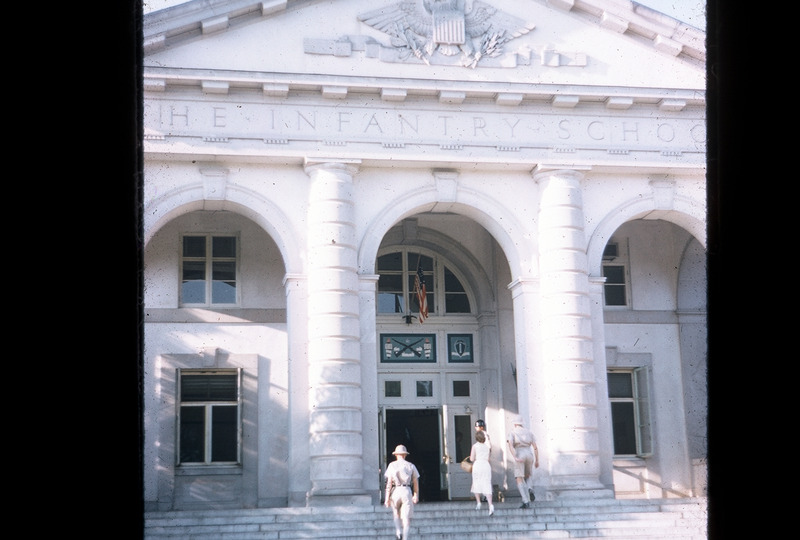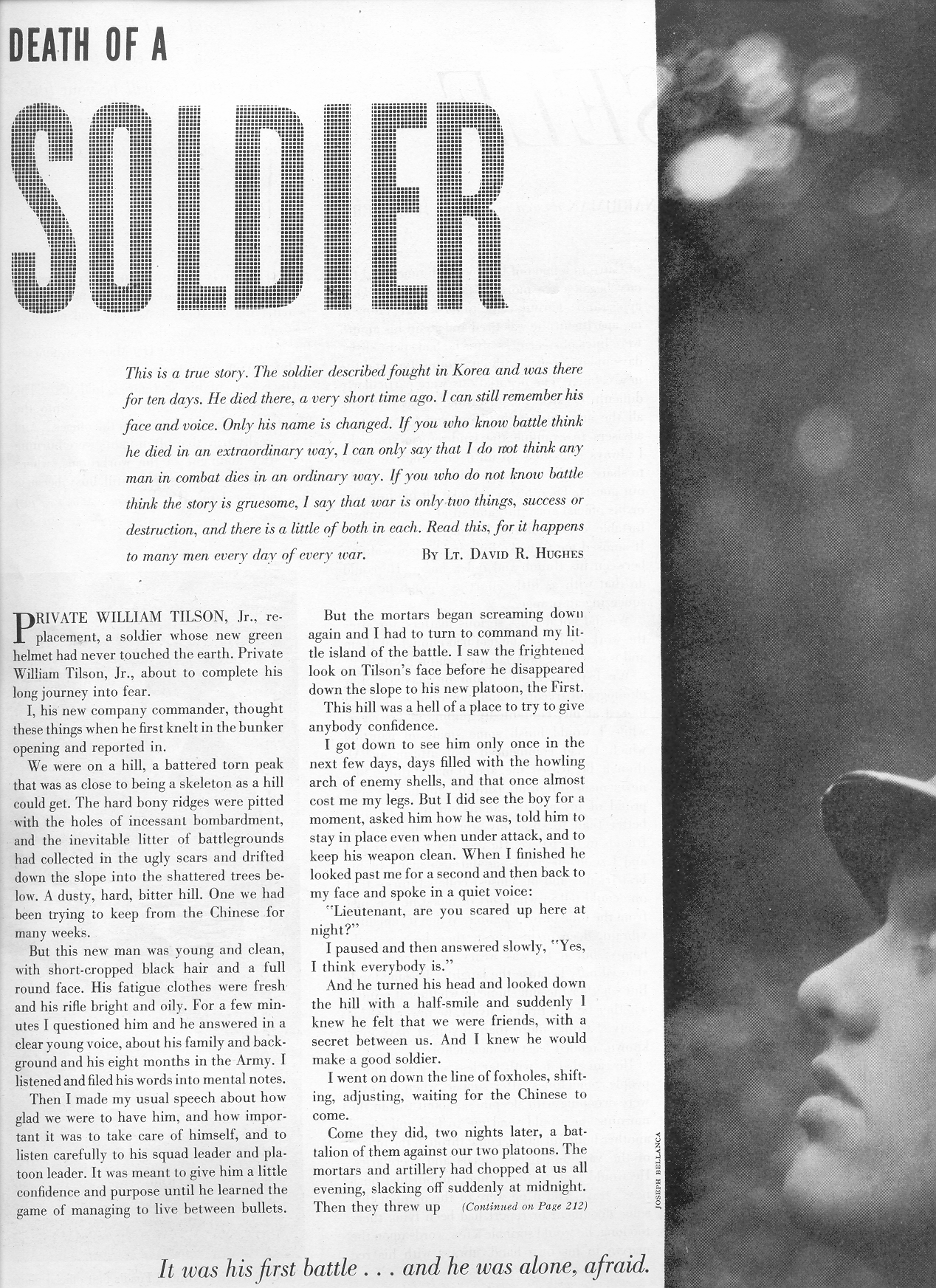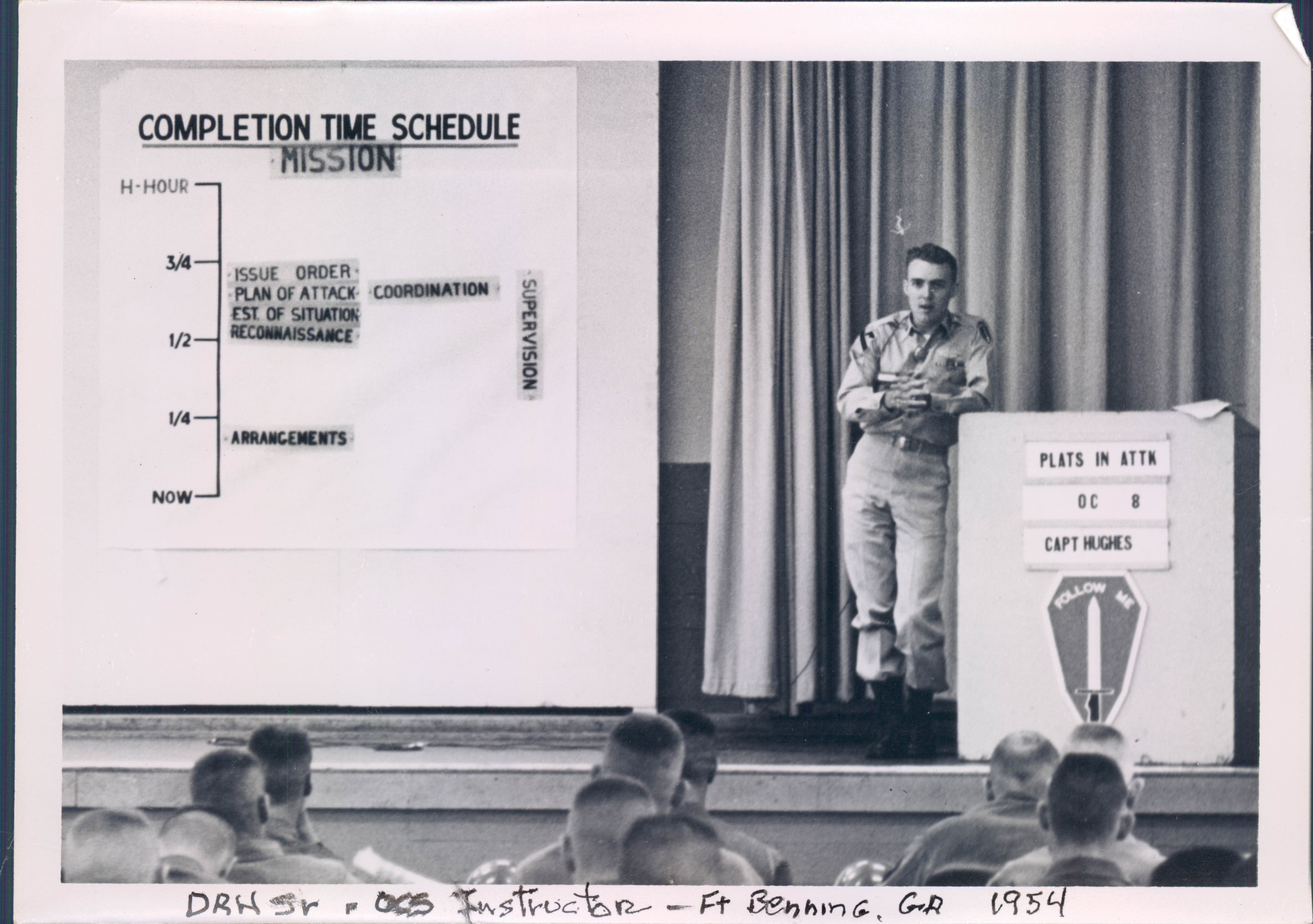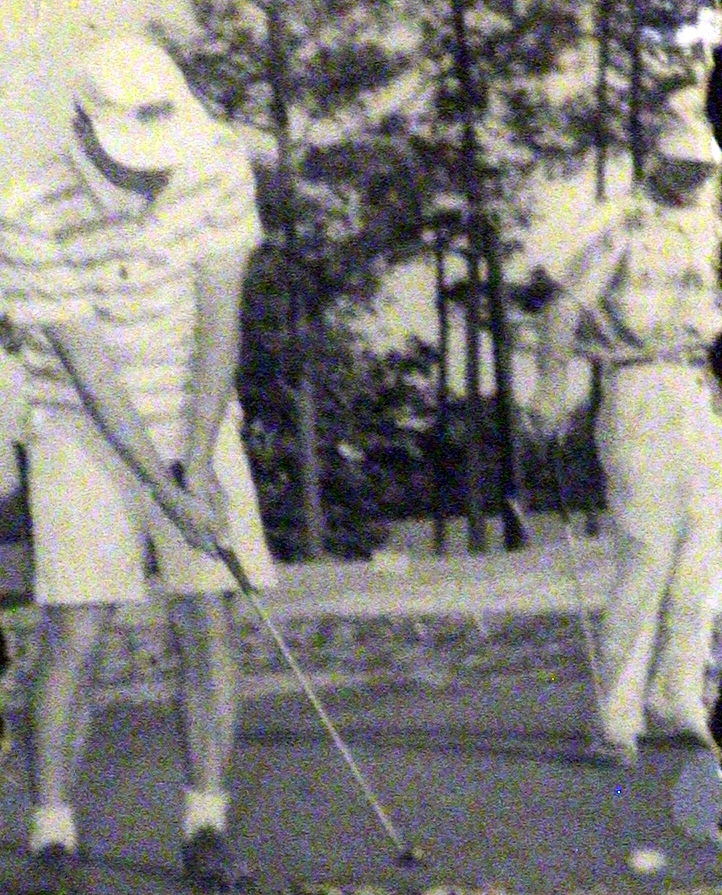- Details
- Written by dave
- Category: Fort Benning
- Hits: 4836
 |
My Fort Benning Years
My orders said to report to the Infantry School, Fort Benning, Georgia.
It was ironic that part of the reason the Army sent me to the Infantry School was to 'catch me up' on that Infantry Officers Basic Course I never got coming out of West Point - which all our Infantry Branch grads were supposed to have had before any of them went into combat in Korea. That was just for me to get my 'ticket punched' showing I had that 'school.' Even though I already had more Infantry Combat during my first year in Korea, than any of the 'TIS' Instructors!
And the other reason I was sent there, was because I WAS so experienced that the School wanted me as a combat experienced and highly decorated junior Army officer to teach the Officer Candidates, ROTC officers just coming on active duty, and to teach subsequent classes of West Point Infantry graduates BEFORE they went into combat!
But I never really fit into the way the Infantry School teaches Infantry Tactics. Part of the reason was that I learned - as the saying goes 'OJT' -On The Job Training', and NOT from the doctrinal Field Manual 7-10 "The Rifle Company in the Attack"
By my largely applying the broad Principles of War I learned at West Point in Military History, I made it up as I went along.
In brief, I had a mental clash between 'what worked in Korea' and Army 'Doctrine' on how it should work! Using methods largely derived from World War II Tactics.
Then as I was put in the 'Platoon Committee' - where 2d Lieutenants start their Infantry officer careers, my very substantial combat record, attested to by the Distinguished Service Cross, two Silver Stars, one Bronze Star for Valor, the Greek Cross of War, two Purple Hearts, and Combat Infantry Badge - got in the way of my just delivering Doctrinal Content. Both the older officers - senior captains and majors - who had served in WWII but with very little combat - were somewhat intimidated by me. They were in the committees because there were too few Korean War returnee Infantry officer with fresh combat experiences to 'staff' the Infantry School.
That would change in time, but I sort of stuck out as a sore thumb when I got there.
|
|
Duty and Pleasure
I couldn't really complain, for as I wrote here under 'Married Years' I started courting Patsy Simpson almost as soon as I got to Benning. And marriage to her would get me out of those dismal, hot, southern US Bachelor wooden Barracks and into more modern Married officers Quarters.
So while I had plenty to do while off duty, I was perfectly content buckling down to become an Instructor - who was as comfortable in a classroom full of new lieutentants, as I was in the field training, where the lessons were applied on real ground - which is never nice and tidy as it is in Field Manual Maps.
My Writings Pursued Me
It should not have surprised me that, because of the number of publications which had published my writings - from Shanks Bootees to my ruminations on what it means to be a combat leader that was entered into the Congressional Record - I seemed to be locally very 'newsworthy' as Fort Benning and Columbus Georgia newspapers kept writing about what I had published. As well as making pretty good news each time I was called into the Headquarters for an Awards ceremony, as neither my last Silver Star or the Distinguished Service Cross had been formally presented to me.
But my intense Combat experience over the past year was not out of my system yet. I couldn't just forget about the men who died, and who were injured while we fought. That kept getting to me to the point it became part of my discussions with Patsy as my future wife. And I had much to talk with now Major John Flynn, who was my first company commander, and then as an Operations Officer working for controversial Colonel Dan Gilmer before being wounded, sent home, and then to Fort Benning to take the Advanced Infantry Course and be an Instructor.
Flynn, married to his new wife Nancy, lived in Fort Benning quarters - newer small, but quite adequate brick structures. I hung out with them, both by myself and with Patsy. He was expecially interested in amplification of my 8 page letter I had sent him in early March from Seattle, not knowing that I would see him later at Fort Benning.
I still felt I wanted to write something more profound than either Shanks Bootees or the philosophical pieces that had become pretty famous - as many Army wives at large Fort Benning were subscribers to the Ladies Home Journal and read it as it was printed while I was at Benning.
I had not written anything coming out of the horrendous battles of Hill 339 or 347 less than a year before. They had affected me to the point that I realized I had what today would be branded Post Traumatic Stress Disorder - PTSD. It was very mild, but exhibited by my being moved to tears - emotionally more easily than I ever had in my life before.
So I wrote a story that the Ladies Home Journal readily accepted. Named "Death of a Soldier" in which I relate the reality and my reaction to the death of one of my soldiers during the battle on the night of the 28th of September 1951, on Hill 339. The soldier was real, as was his death, but I did not use his real name.
It was a 2,000 word story accepted, published in April 1953, and I was paid $1,000 for it - $.50 a word.
"Death of a Soldier" is in the next chapter of this writing - 'Fort Benning (2)'
- Details
- Written by dave
- Category: Fort Benning
- Hits: 4541
Here is what the front page of the story looked like in the Ladies Home Journal. April, 1953

The actual soldier who died was Cpl Frank Hagen Jr, whom I mention in the Fickle Gods of War piece in Korean War (28).
This is a true story. The soldier described fought in Korea and was there for ten days. He died there, a very short time ago.
I can still remember his face and voice. Only his name is changed.
If you who know battle think he died in an extraordinary way, I can only say that I do not think any man in combat dies in an ordinary way.
If you who do not know battle think the story is gruesome, I say that war is only two things, success or destruction, and there is a little of both in each. Read this, for it happens to many men every day of every war.
By Lt. David R. Hughes, Hill 339, Korea, September, 1951
DEATH OF A SOLDIER
Private William Tilson, Jr., replacement, a soldier whose new green helmet had never touched the earth. Private William Tilson, Jr., about to complete his long journey into fear.I, his new company commander, thought these things when he first knelt in the bunker opening and reported in.
We were on a hill, a battered torn peak that was as close to being a skeleton as a hill could get. The hard bony ridges were pitted with the holes of incessant bombardment, and the inevitable litter of battlegrounds had collected in the ugly scars and drifted down the slope into the shattered trees below. A dusty, hard, bitter hill. One we had been trying to keep from the Chinese for many weeks.
But this new man was young and clean, with short-cropped black hair and a full round face. His fatigue clothes were fresh and his rifle bright and oily. For a few minutes I questioned him and he answered in a clear young voice, about his family and background and his eight months in the Army. I listened and filed his words into mental notes.
Then I made my usual speech about how glad we were to have him, and how important it was to take care of himself, and to listen carefully to his squad leader and platoon leader. It was meant to give him a little confidence and purpose until he learned the game of managing to live between bullets.
But the mortars began screaming down again and I had to turn to command my little island of the battle. I saw the frightened look on Tilson's face before he disappeared down the slope to his new platoon, the First.
This hill was a hell of a place to try to give anybody confidence.
I got down to see him only once in the next few days, days filled with the howling arch of enemy shells, and that once almost cost me my legs. But I did see the boy for a moment, asked him how he was, told him to stay in place even when under attack, and to keep his weapon clean. When I finished he looked past me for a second and then back to my face and spoke in a quiet voice:
"Lieutenant, are you scared up here at night?"
I paused and then answered slowly, "Yes, I think everybody is."
And he turned his head and looked down the hill with a half smile and suddenly I knew he felt that we were friends, with a secret between us. And I knew he would make a good soldier.
I went on down the line of foxholes, shifting, adjusting, waiting for the Chinese to come.
Come they did, two nights later, a battalion of them against our two platoons. The mortars and artillery had chopped at us all evening, slacking off suddenly at midnight. Then they threw up a red flare and came up, bugling, howling, shooting and throwing their uncountable grenades. We didn't have a prayer of holding them with a line. They hit both flanks and overran the First Platoon, driving up so fast we barely stopped them at the peak with the radio operators and messengers. I frantically formed a new line, expecting them to hit before it was complete. But something held them up for a few minutes and I heard the unmistakable firing of stubborn American rifles down in the dark patch where the First Platoon had once existed. They hit again, but we had a perimeter now and only had to draw up a little tighter as men fell. They hit two more times, and managed for a few intense moments to pour over the thin line, but the mortar men and machine gunners shot them down between their mortars and we held. When day broke we defended only the very peak. But that was enough, and the attackers melted down the ravines while we pushed out again down the ridges.
We had won.
The morning was difficult as we tried to clear out our own casualties and their dead, because they kept pouring steel into the hill in frustrated vengeance. I had to dive for cover often as I moved around the company front.
I had just topped the last rise of ground near the end of the First Platoon positions, and started down the saddle when the faint chug chug sounds of distant mortars came to me. I stopped for a second and looked for a place to go. Then the first whispering sent me flying into the bunker ahead. The shells slammed down all around and I hugged the dirt floor.
At last it let up and I crawled forward. There was a crumpled figure ahead. I saw a tan boot.
Private William Tilson, Jr., was lying forward as if asleep, his new boot soles turned up. The new green helmet lay beside him, stained and dark. His bright rifle still rested on the parapet with a shattered stock, and an empty ammunition bandoleer hung limply from a peg. An envelope lay bes ide him, with the letter in the dirt beneath it.
How did he die? I could guess.
An explosion jabs into the light sleep of Private Tilson. He opens his eyes and lies tensely in the bottom of the foxhole, listening.
Everything is quiet.
Whistle, slam! Another explosion right in front of his position.
Tilson crawls up and looks carefully over the parapet. Blackness. Nothing.
Whang! A jagged flash off to the right and a metallic explosion.
Somebody is firing mortars at the ridge where his foxhole is. Everything else is quiet except for the click of metal over to the right where Matta and Clark have a foxhole.
Suddenly a red ball rises quickly far out in front of him, arching and burning out as it starts down again. A rifle snaps. Then two nore and all along the ridge weapons start firing. Down the ravine a small white glow grows into brightness and light fills the trees and bushes. A flare has been tripped and
Tilson sees figures coming up the hill. They are not shooting yet. They are just a mob in smoking white light. They are the enemy.
Real fear stabs at Private Tilson for the first time.
Here they come.
What shall I do?
What shall I do?
He yells to Matta and is answered by a muffled cry. He looks down the ravine again with a rising fear before he remembers his rifle.
Get my rifle ready.
Get my grenades ready.
Get ready.
Jagged thoughts run throuh Tilson's head and his heart pounds. The rustling mass of sound is nearer and the light is out.
Wait. I can't see them. Wait for light. He clicks off the safety on his rifle and points it down the ravine. He stacks some more clips along the parapet. He peers into the darkness below. They are very noisy, he thinks.
His palms are wet.
A parachute flare pops above and in the sudden reddish light firing begins again on his right. Mortar shells whisper down behind him and explode. Then he really sees them. Six figures down about fifty yards. One stops for a moment. Tilson sights and fires. The sound and recoil. startle him. He fires again, and the Chinese below begin shooting back The first rip of fire snaps by Tilson's head. A machine gun replies. The ravine comes alive with red twinkles.
Tilson fires, looking for something definite, something slow, but everything is quick and fluid and the twinkles are lost too soon
in the blackness. A surprising figure looms ahead and fires, but it goes down quickly. Another flare. More figures, crawling. The crackle of rifles mingles with thumping of grenades and yelling of high-pitched voices.
Something comes looping up toward him and explodes right in front of him.
Then they rush, screaming, as he fires blindly. Slugs tear into the earth beside him. Another flare. Two figures on the right. Throw a grenade. More on the left. They're everywhere. I'm doing what they told me to do! Fire faster, faster! Please, gun, don't jam. Oh, please don't jam. I can't stop them. A blinding flash. Dirt. Throw a grenade, another and another. A figure jumps up, arm back. Tilson fires. The figure falls and rolls. Another flare. They're everywhere. I can't stop them. I can't stop them.
They are going to kill me.
The thought drains away as another comes drumming through his head.
Get out. Go back while there is time and run run, run.
It makes him stop firing. He looks back at the dark trench that goes over the hill behind. The enemy fires, yells and moves. He hears a GI yell out a curse and fire his rifle, fast, four times. And he realizes that all along there have been men near him, to his right and to his left. And he knows that one of them is still there.
And William Tilson, Jr., leans forward and begins firing methodically into the darkness. He puts his fear down like a toy and becomes calm and deadly.
He is not going to leave.
For reasons born in the depths of him, unrecognized even by himself, William Tilson, Jr., son of William Tilson, the keeper of a little store, son of Bertha Tilson, the talkative woman, brother of Frank Tilson, the married clerk, makes his decision. He fires again and again, standing in his bunker, and the point of no return goes past in the race of time and bullets. In a dim room where William Tilson, Jr. is alone, a door closes and the black waters of certainty spread across the floor, lapping at his legs.
But for that instant, the world of William Tilson, Jr., is in perfect balance.
Then the yelling is thunder, and the thunder is death.
Artillery rumbled somewhere and far to the northeast white smoke obscured a hill for a moment and then streamed off in a long low cloud, leaving the peak sharp and clear against the morning sky.
I picked up the envelope and letter and looked for a while at the clear blue words written across the top:
My Dear Son...
-----------------------------------------------------------------------
- Details
- Written by dave
- Category: Fort Benning
- Hits: 4590
My Second Year At Benning
Its hard for me to believe, but I only spent two full years at Fort Benning.
The first year - from May, 1952 through June of 1953 was taken up by my teaching Infantry Tactics to junior Infantry Officers or OCS Officer Candidates, ROTC graduates who were newly commissioned, or West Point graduates who had chosen Infantry branch of service. And courting Patsy Simpson.
Well, we got married June 21st, 1953, had a month's leave and honeymoon, during which we visited the Department of English at West Point, and Professor Colonel Alspach, who had spotted my writing talent while I was still a cadet, took steps to get me sent to Graduate School, and then do a full 3 year tour teaching English at West Point. That sequence would start in the fall of 1954.
So I had the second year at Benning, starting with our moving into married Officers Quarters in August, 1953. Ironically we became eligible to move into the same quarters John and Nancy Flynn had occupied since 1952, while he was ordered to report to an assignment at West Point, where I would run into him again.
I was then ordered to take the Advanced Infantry Course right there at Benning in the fall and spring of 1954. Since that was a 'TDY' - temporary duty assignment - from my regular assignment to the Infantry School as an Instructor, that was no big change.
The Army staff, in its infinite wisdom, wants every officer to march through a series of progressive - branch specific - schools and courses - Basic/Advanced Infantry, Command and then the more general General Staff College - and if one is promising enough, on to the Army War College. I was starting on the bottom rung of that ladder, even though I had had a year in combat and been a commander. But the Army machine marches on regardless.
So, while I first taught at 'The Infantry School' the first year, and Patsy and I socialized with that 'faculty' of mid grade officers and their wives, while I was courting her, the second year, as a 'student' after we were married we socialized with Infantry lieutenants and captains, some of whom had already served in combat in the Korean War as I had - and others would be on the way there soon.
I began to get acquainted with the first of my fellow Infantry officers of about my age with whom I might serve and encounter the rest of my career. That included a number of Foreign Army officers, from various other countries, such as Pakistan, Thailand, Britain, Phillipines, and South and Central American countries. They came to learn 'how' the American Army worked at its combat unit level. Those who were sent to the US to go to one of its 'military' schools often were destined to rise to high positions in their own military or governments. They most often 'modelled' their Army after our WWII successful one. And they also took courses at Benning in order to learn about and shoot all our US Army Infantry weapons, which their countries either bought or we provided as part of Military Foreign Aid, as the Cold War was starting up and they might be fighting with them.
Ironically, one officer was in the Defense Forces of Japan, and had been affected by radiation from the 1945 Nagasaki atomic bomb we dropped.
Since Patsy got pregnant in the fall of 1953, much of her socializing was with her family - mother Mary, and sisters whom we had visited and her brother Bailey Jr who had gone into the Airborne at Benning.
The one major 'social' - you might call it - activity that the 40 or so classmates of mine in the course engaged in was golf. Every afternoon when classes let out, scores of my classmates (and those in other like-courses at sprawling, large Fort Benning), headed for the Fort Benning Golf Range.
I had never really taken up golf, but as the 'cultural myth' held that every successful business man or military officer 'should' know and play golf, I decided to give it a go. There was not a lot of other activities I could get into with pregnant Patsy, and we had no kids - yet. We had had a little golf instruction at West Point as cadets. And since Major Bailey Simpson, Patsy's father had time off, sometimes I would play with him, and at others with my classmates.
I was never a hot shot at that frustrating game. I always shot in the 80s or worse. But I enjoyed playing, bought clubs, and chatted away for 9 or 18 holes repeatedly.
New Orders and Move
In the spring of 1954 came my new orders, which specified I was to be entered into a Master of Arts Degree program at the University of Pennsylvania in the fall. And I was authorized to make what is called a 'PCS' (permanent change of station) move with all our household goods to someplace near the University.
David R Hughes, III was born May 3d, 1954, and family life started in earnest.
So Patsy and I underwent our first Military Move in June or July 1954, with child. The moving van arrived, and everything including the very nice furniture we had bought on our Honeymoon and was shipped to Fort Benning was packed and on the way.
Taking our leave of Patsy's mother and father - he was about to retire to a small house on Ticknor Drive just outside Benning, in Columbus - we took our time driving up the coast where we visited Patsy's sister Arleigh and her husband and daughter.
From some of the advice we got from other West Point instructors who had gone to the same University of Pennsylvania, we chose not to live in costly Philly, or even in Camden, New Jersey, right across the river. We chose an apartment complex in Haddonfield, New Jersey, within a tolerable daily drive for me to the University Campus.
So we got there, signed up for the apartment, and moved in.
To continue with my Military Years click… NEXT, Back to College (1)


